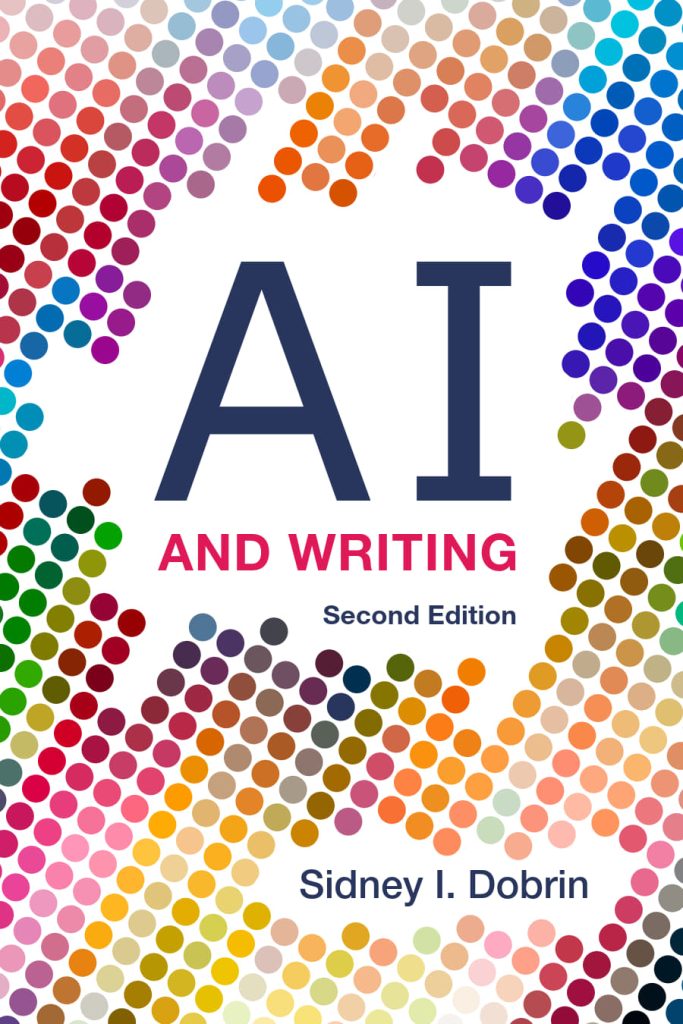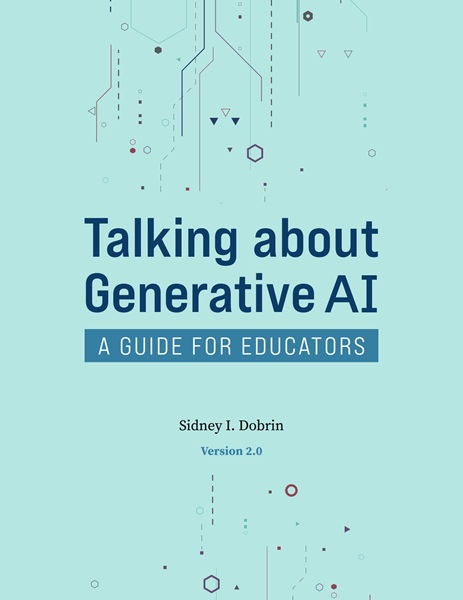Talking about Generative AI: A Guide for Educators 2.0
By Sidney I. Dobrin
Free PDF booklet, Version 2.0
70 pages
Table of Contents
Click here to download a PDF of Talking About Generative AI 2.0
A thoroughly revised and updated free resource for educators and administrators.
Instructors and college administrators are grappling with a number of challenges brought about by the emergence of generative AI tools such as ChatGPT:
- What impact is AI having on post-secondary institutions?
- Can AI be integrated into higher education in productive and ethical ways?
- How will teaching and assessment change?
- What are the implications of AI for professional, institutional, and civic communication?
This free resource provides administrators and faculty with indispensable information about GenAI and its bearing on instruction, departmental planning, and institutional policies. Highly practical and up to date, Talking about Generative AI 2.0 will be of interest to anyone who is confronted with the problem of how to understand and address GenAI’s impacts—which is to say, virtually everyone involved in education.
Version 2.0 has been comprehensively revised and updated to reflect the rapid technological, conceptual, and social shifts in this evolving field. Each section includes new material relevant to both classroom instructors and administrators, and four new chapters explore assessment, faculty development, workplace readiness, and institutional infrastructure.
Comments on 1.0:
“Compact and thought-provoking—Dobrin’s pamphlet is a signpost to the survival of our disciplines as we adapt to the brave new world of GenAI.”
– Wesley Beal, Lyon College
Contents
Goals of this Resource
01 What Is Generative Artificial Intelligence?
- How Does Generative AI Work?
- Generative AI and Higher Education
- History of Writing Technologies and Resistance to Them
- Generative AI Is Not as New as You Think
- Generative AI Across Disciplines
02 Artificial Intelligence and Administrative Policies
- Policy and Prohibition
- AI and Your Institution’s Mission and Strategic Goals
- AI and Your Institution’s Digital Literacy, Competency, and Fluency Efforts
- Accessibility, Diversity, and Bias
- Privacy
- Other Concerns
03 Artificial Intelligence for Course Instructors
- Curricular Relevance (or, Why Integrate GenAI?)
- Generative AI and Integrity
- Authenticity and the Plagiarism Problem
- Designing Assignments that Outpace GenAI?
- Assignment Design in the Here and Now
- Generative AI and Writing Instruction
- Product Versus Process (Same as It Ever Was)
- Generative AI and Reading
- Generative AI and Instructor Labor
04 Artificial Intelligence and Assessment
- A (Very) Reductive History of Assessment in Higher Education
- Why We Assess
- Reimagining How We Assess
05 Artificial Intelligence and Student Career Readiness
- Workplace AI Literacy
- Learning to Learn
- Industry to Curricula
- Future of Work
06 Faculty Development
- Faculty AI Readiness
- Faculty Needs
- Professional Development Programs
- AI Literacy for Instructors
- Labor and Job Security
- Cultures of Obsolescence
07 Infrastructure
- Technological Support
- Training and Development
- Compliance
- Sustainability
- Institutional and Public Perceptions
08 Best Practices
- Strategies for Developing Best Practices
Conclusion: A Parable of the Luddites
Glossary
AI and Writing – Second Edition

AI and Writing is an indispensable guide to composing with generative AI. Sidney I. Dobrin prepares students to use GenAI effectively, ethically, and critically—skills now essential for academic and professional success. The book tackles core questions: What tasks do these tools best support? Where do they fall short? How are they used responsibly?
Dobrin focuses on durable, transferable writing practices, as well as the real-world issues raised by AI, including authorship, plagiarism, copyright, bias, and the material consequences of AI. “Provocations” boxes spark critical engagement, and each chapter concludes with a sequence of exercises and activities that move students from analysis to hands-on experimentation and reflection.
Sidney I. Dobrin is Professor and Chair of the Department of English at the University of Florida, and for ten years directed its writing program. He is the Founding Director of the Trace Innovation Initiative, serves as a Digital Thought Leader for Adobe, and is a member of the Florida Institute for National Security, which is part of the University of Florida’s Artificial Intelligence Initiative. Dobrin is the author and editor of numerous books and articles about writing, technology, and ecology.
He is available to consult with post-secondary institutions about generative AI, including policy development, curricula, and the development of faculty training programs. Please contact him for further information.
